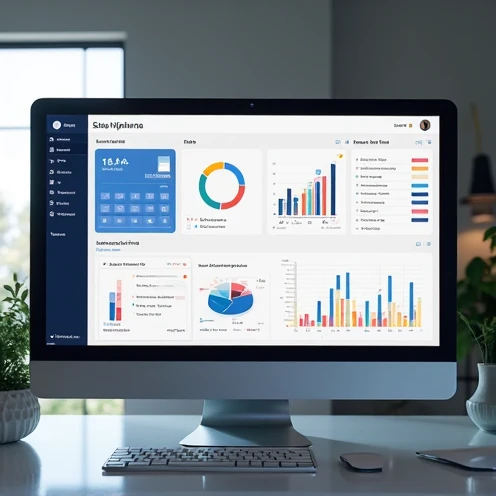Customer relationship management (CRM) has become an essential tool for modern businesses. Among its various applications, Field Service CRM stands out as a specialized solution designed to optimize customer service in industries where on-site operations are critical. Whether you run a service-based company in utilities, healthcare, or manufacturing, this system ensures seamless communication between teams, streamlined scheduling, and faster response times.
Iklan Google AdSense
Field Service CRM not only helps manage customer data but also integrates field operations with back-office processes. This allows businesses to provide consistent and reliable service experiences. As a result, companies can maintain stronger customer relationships, improve loyalty, and increase profitability.
What Makes Field Service CRM Different?
While traditional CRM systems focus mainly on sales, marketing, and customer communication, Field Service Customer Relationship Management goes further by managing field technicians, service appointments, inventory, and work orders. This holistic approach ensures that businesses can deliver outstanding customer experiences from the first interaction to after-sales support.
Iklan Google AdSense
Why Every Service Business Needs It
In today’s competitive market, customers demand quick, efficient, and personalized services. A company that invests in Field Service Customer Relationship Management gains the advantage of operational efficiency and a better understanding of customer needs. Ultimately, it builds trust and drives growth.
The Evolution of CRM in Business
CRM solutions have evolved dramatically over the last two decades. Initially, they were simple contact databases. However, with technological advancements, CRMs have transformed into powerful platforms integrating sales automation, AI, analytics, and mobile access.
The introduction of Field Service CRM is a natural progression in this evolution. Businesses realized that customer satisfaction depends heavily on how well service teams perform in real-world scenarios. Therefore, a specialized system was needed to bridge the gap between office-based operations and field teams.
From Paperwork to Digital Efficiency
Gone are the days of manual scheduling and paper-based records. Field Service Customer Relationship Management digitizes every step of the customer journey, from booking appointments to tracking technician performance. This shift not only reduces human errors but also boosts productivity by saving time and resources.
Key Features of Field Service CRM
Every business considering Field Service Customer Relationship Management should understand its essential features. These functions are designed to enhance efficiency and customer satisfaction simultaneously.
Some of the most important features include:
- Work order management to assign and track tasks for technicians
- Real-time scheduling to optimize routes and reduce delays
- Mobile access that empowers field workers to access data on-site
- Inventory tracking to ensure necessary parts are always available
- Customer communication tools to keep clients informed about service updates
The Role of Automation
Automation is at the heart of Field Service Customer Relationship Management. By automating repetitive tasks like scheduling and reporting, businesses free up time to focus on value-driven activities such as personalized customer engagement. This not only improves service speed but also enhances accuracy.
How Field Service CRM Improves Customer Experience
Customer experience is a key differentiator in today’s market. Field Service Customer Relationship Management enables businesses to respond to customer needs faster and more effectively. For example, if a customer requests urgent repair, the system can automatically assign the nearest available technician.
Moreover, with real-time updates, customers are informed about appointment times and technician details, reducing uncertainty. This transparency builds trust and makes clients feel valued.
Building Long-Term Loyalty
When customers consistently receive timely, professional service, they are more likely to remain loyal. Field Service CRM helps businesses build lasting relationships by ensuring reliability, personalization, and consistent quality. In turn, this loyalty translates into repeat business and positive referrals.
The Role of Mobile Technology in Field Service CRM
Mobile accessibility is one of the most transformative features of Field Service Customer Relationship Management. Field technicians can use mobile apps to receive assignments, check customer history, and update service status instantly.
This mobility ensures that data is always accurate and up to date. Managers can also monitor performance in real time, enabling quick decisions and adjustments. The result is a highly agile service team that can meet customer demands more effectively.
Enhancing Productivity on the Go
Mobile technology also reduces downtime. Instead of waiting for instructions or returning to the office for paperwork, technicians can complete tasks directly on their devices. This streamlined workflow boosts productivity while reducing operational costs.
Integrating Field Service CRM with Other Business Tools
To maximize effectiveness, Field Service Customer Relationship Management can be integrated with other business systems such as ERP, billing software, and customer support platforms. This integration ensures that all departments share the same data, reducing duplication and errors.
For example, when a work order is completed, the system can automatically generate invoices and update inventory records. This interconnected approach saves time and enhances overall efficiency.
Data-Driven Decision Making
Integration also improves data analytics. By consolidating information across systems, businesses gain deeper insights into customer behavior, technician performance, and resource utilization. This allows for more informed decision-making and strategic planning.
Challenges in Implementing Field Service CRM
Despite its many benefits, implementing Field Service CRM can present challenges. One common issue is resistance to change among employees who are accustomed to traditional methods. To overcome this, businesses must invest in proper training and change management.
Another challenge is ensuring data accuracy during migration from legacy systems. Without clean data, the CRM may not function effectively. Companies should carefully plan and test the migration process to avoid disruptions.
Overcoming Obstacles for Success
With the right strategy, businesses can overcome these challenges. Clear communication, phased implementation, and continuous support can ensure a smooth transition. Once employees see the benefits, adoption rates usually improve significantly.
Future Trends in Field Service CRM
The future of Field Service CRM looks promising, with innovations like artificial intelligence (AI), machine learning, and IoT integration already making waves. For instance, predictive analytics can forecast when equipment is likely to fail, allowing for proactive maintenance.
Voice assistants and chatbots are also being integrated, making it easier for customers to schedule services or get updates. These advancements promise even greater efficiency and customer satisfaction.
Staying Ahead of the Curve
Businesses that embrace these trends will gain a competitive edge. By continuously evolving and adopting new technologies, companies can future-proof their operations and remain leaders in their industry.
Best Practices for Maximizing ROI with Field Service CRM
To fully leverage Field Service CRM, businesses should follow best practices. Start with clear objectives, such as reducing response time or improving first-time fix rates. Align these goals with the CRM’s features to ensure measurable results.
Regularly monitoring performance metrics is also essential. By analyzing KPIs such as technician efficiency and customer satisfaction scores, businesses can identify areas for improvement and make data-driven adjustments.
Continuous Training and Support
Investing in ongoing training ensures that employees stay updated with the latest features and functionalities. Continuous support also encourages greater adoption and maximizes the return on investment (ROI).
Real-Life Success Stories with Field Service CRM
Many businesses have already experienced the transformative power of Field Service CRM. Utility companies, for example, have reduced downtime and improved response times by optimizing technician schedules.
Similarly, healthcare providers use Field Service CRM to manage medical equipment maintenance, ensuring patient safety and regulatory compliance. These success stories highlight how versatile and impactful the system can be across industries.
Lessons from Industry Leaders
By studying these success stories, other businesses can gain inspiration and adopt strategies that suit their unique needs. This accelerates digital transformation and ensures sustained growth.
Why Field Service CRM is Essential Today
In conclusion, Field Service CRM is more than just a technology; it is a strategic investment that transforms customer relationships, streamlines operations, and drives growth. Its integration of field and office functions ensures businesses remain efficient, responsive, and customer-centric.
As industries continue to evolve, adopting Field Service CRM is no longer optional but a necessity. Companies that embrace it today will not only meet current customer expectations but also be prepared for the challenges of tomorrow.
Iklan Bersponsor Google






